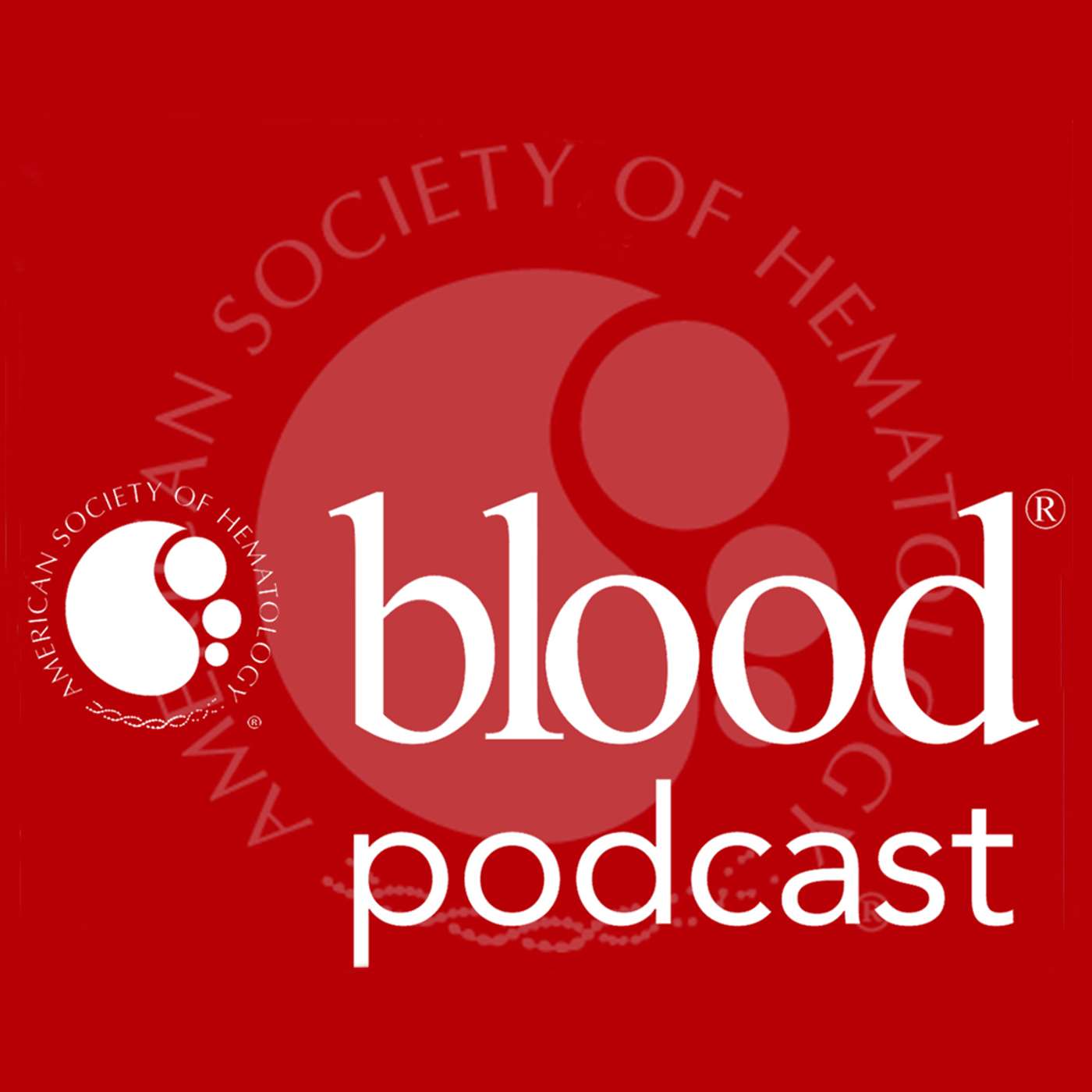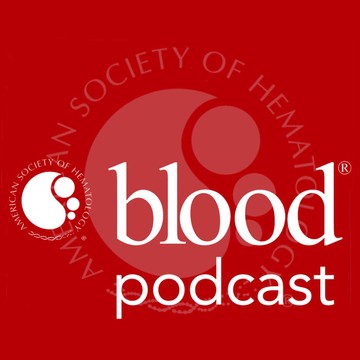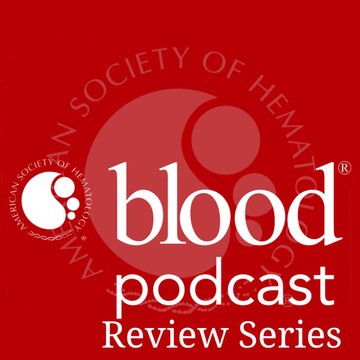

Blood Podcast
American Society of Hematology
The Blood Podcast summarizes content recently published in Blood, the most cited peer-reviewed publication in the field of hematology.
Episodes
Mentioned books

11 snips
Feb 6, 2025 • 19min
Dual TKI targeting in Ph+ ALL; role of liver endothelial ferroportin in iron sensing and homeostasis; severe anemia in pregnant patients with beta-thalassemia minor
Discover the promising outcomes from a Phase I study on a new leukemia treatment using dual tyrosine kinase inhibitors. Uncover the role of ferroportin in iron-sensing within liver endothelial cells and its implications for iron homeostasis. Additionally, learn about concerning anemia trends in pregnant patients with beta-thalassemia minor, highlighting the risks of misdiagnosis and unnecessary treatments. This insightful discussion sheds light on critical advancements in hematology and the challenges faced in maternal health.

Jan 30, 2025 • 21min
First-line zanubrutinib, obinutuzumab, and venetoclax in mantle cell lymphoma; hyperdiploidy in multiple myeloma; and pegcrisantaspase plus venetoclax in relapsed/refractory acute myeloid leukemia
In this week's episode we’ll learn more about a phase 2 trial of first-line zanubrutinib, obinutuzumab, and venetoclax in TP53-mutated mantle cell lymphoma; early development of hyperdiploidy in multiple myeloma; and a phase 1 trial of the asparaginase pegcrisantaspase plus venetoclax in relapsed/refractory acute myeloid leukemia.Featured Articles:Zanubrutinib, obinutuzumab, and venetoclax for first-line treatment of mantle cell lymphoma with a TP53 mutationDevelopment of hyperdiploidy starts at an early age and takes a decade to completeA phase 1 study of the amino acid modulator pegcrisantaspase and venetoclax for relapsed or refractory acute myeloid leukemia

Jan 23, 2025 • 19min
Targeting C3 in autoimmune hemolytic anemias; venetoclax testing to predict AML response; an improved understanding of the structure of FXIII complex
In this week's episode we'll learn about C3-targeted therapy in autoimmune hemolytic anemias. Based on results of an open-label, phase 2 study, pegcetacoplan was well-tolerated, with encouraging efficacy, particularly in patients with cold agglutinin disease. After that: Venetoclax sensitivity testing to predict AML response. In a significant step toward precision medicine, researchers have validated an assay capable of predicting response to the venetoclax-azacitidine regimen. Finally, an improved basic understanding of human coagulation factor XIII. Investigators present the cryo-electron microscopy structure of Factor XIII complex, providing new insights into etiology and the deleterious effects of certain specific mutations.Featured Articles:Safety and efficacy of pegcetacoplan treatment for cold agglutinin disease and warm antibody autoimmune hemolytic anemiaEx vivo venetoclax sensitivity predicts clinical response in acute myeloid leukemia in the prospective VenEx trialCryo-EM structure of the human native plasma coagulation factor XIII complex

Jan 23, 2025 • 23min
Review Series on Globin Disorders
In this Review Series episode on Globin Disorders introduced by Drs. Thomas Coates and Irene Roberts, we’ll hear from Dr. Douglas Higgs and Dr. Mitchell Weiss as they address advances in our understanding of globin gene biology.Click here to view the complete Review Series featured in Volume 144 Issue 8 of Blood.

Jan 16, 2025 • 22min
Brentuximab vedotin, nivolumab, and chemotherapy in classical Hodgkin lymphoma; type 1 interferon signaling in sickle cell disease; and type 1 human leukocyte antigen gene mutations in cutaneous T-cell lymphoma
In this week's episode we’ll learn more about an experimental regimen for classical Hodgkin lymphoma that combines brentuximab vedotin, nivolumab, and chemotherapy; a possible role for type 1 interferon signaling in developing autoantibodies to red blood cells in sickle cell disease; and how genomic alterations affecting class I human leukocyte antigen molecules may affect patients with cutaneous T-cell lymphoma. Featured Articles:Brentuximab vedotin, nivolumab, doxorubicin, and dacarbazine for advanced-stage classical Hodgkin lymphomaIFN-I promotes T-cell–independent immunity and RBC autoantibodies via modulation of B-1 cell subsets in murine SCDGenetic alteration of class I HLA in cutaneous T-cell lymphoma

Jan 9, 2025 • 17min
Iron overload aggravates MDS pathophysiology; long-term outcomes after TPO-RA treatment in ITP; new insights into APL treatment outcomes by age and risk
In this week's episode we'll learn about the role of iron in myelodysplastic syndromes, or MDS. After that: long-term treatment outcomes in immune thrombocytopenia from the STOPAGO study. Finally, new insights into APL treatment outcomes and prognostic factors from the large-scale Harmony APL project which used ATRA-Arsenic combination therapy.Featured Articles:Genetic iron overload aggravates, and pharmacological iron restriction improves, MDS pathophysiology in a preclinical studyLong-term follow-up of the STOPAGO studyAcute promyelocytic leukemia: long-term outcomes from the HARMONY project

Jan 2, 2025 • 20min
Dexamethasone dosing in newly diagnosed multiple myeloma, a new experimental model of X-linked sideroblastic anemia, and ciltacabtagene autoleucel in real-world myeloma treatment
In this week's episode, we’ll learn about the prevalence and impact of dexamethasone dose reductions during triple or quadruple therapy for newly diagnosed multiple myeloma, a conditional knockout mouse model for testing gene therapy in X-linked sideroblastic anemia, and real-world efficacy and safety of ciltacabtagene autoleucel in patients with relapsed/refractory multiple myeloma.Featured Articles:Dexamethasone dose intensity does not impact outcomes in newly diagnosed multiple myeloma: a secondary SWOG analysisAn erythroid-specific lentiviral vector improves anemia and iron metabolism in a new model of XLSASafety and efficacy of standard-of-care ciltacabtagene autoleucel for relapsed/refractory multiple myeloma

Dec 26, 2024 • 19min
Comparing BTK inhibitors in relapsed/refractory CLL; unraveling the genetic background of the AnWj-negative blood type; rapid adaptation of CLL cells to venetoclax
Discover the latest advancements in CLL treatment as researchers compare BTK inhibitors, revealing zanubrutinib's promising edge over ibrutinib. Unravel the genetic mysteries behind the rare AnWj-negative blood type, shedding light on its unique characteristics. Finally, explore how CLL cells cleverly adapt to venetoclax therapy, highlighting the crucial roles of BCL-2 and BAFF in their survival. This unique blend of science sheds new light on cancer treatment and genetic research!

Dec 19, 2024 • 20min
Primary resistance to BCMA-targeted bispecifics in multiple myeloma, emapalumab therapy in hemophagocytic lymphohistiocytosis, and chemotherapy-induced pyroptosis as a mechanism of thrombus formation in patients with cancer
Discover how primary resistance mechanisms impact treatments for multiple myeloma and the role of BCMA-targeted bispecific T-cell engagers. Explore the promising effects of emapalumab therapy on pediatric patients with hemophagocytic lymphohistiocytosis undergoing stem cell transplants. Learn about GSDME-mediated pyroptosis and its connection to increased thrombotic risks in patients receiving cancer chemotherapy. This dynamic discussion uncovers significant advancements in hematological therapies and potential new strategies for improving patient outcomes.

Dec 12, 2024 • 19min
Unravelling follicular lymphoma subtypes; stroke rate trends in sickle cell disease; procoagulant platelet activation promotes venous thrombosis
In this week's episode, unravelling follicular lymphoma subtypes. Researchers dissect the biological diversity of follicular lymphoma and introduce a new prognostic mode, that could change the way this B-cell neoplasm is subtyped and treated. Then, concerning stroke rate trends in sickle cell disease. A new report shows increasing rates of cerebrovascular events among people with SCD in California. Finally, procoagulant platelet activation promotes venous thrombosis. Investigators report finding procoagulant platelets in the circulation and in thrombi of patients and mice with DVT or PE. Featured Articles:Follicular lymphoma comprises germinal center–like and memory-like molecular subtypes with prognostic significanceRates of strokes in Californians with sickle cell disease in the post-STOP eraProcoagulant platelet activation promotes venous thrombosis


